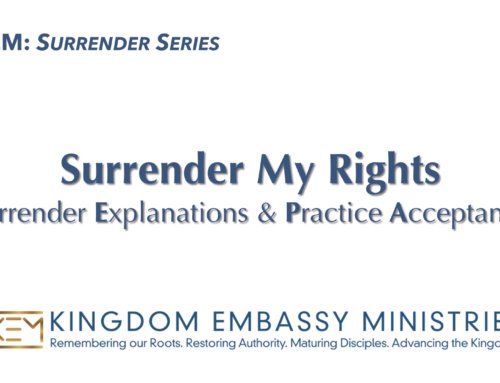Weekly Scriptures | Sermon Notes | Sermon Video
 Are we talking numbers or substance? Is it a question of quantity or quality? Blindness in part has overtaken those of the natural bloodline of Israel, until the fullness of the Gentile converts materializes. The idea of fullness is what holds all the weight here, so to what is Paul referring? Is it the pastoral perspective on fullness, as in all those who will ever come into the faith have been evangelized—the complete number? Or, is it the prophetic perspective on fullness, as in the state of being complete and whole —the mature transformation?
Are we talking numbers or substance? Is it a question of quantity or quality? Blindness in part has overtaken those of the natural bloodline of Israel, until the fullness of the Gentile converts materializes. The idea of fullness is what holds all the weight here, so to what is Paul referring? Is it the pastoral perspective on fullness, as in all those who will ever come into the faith have been evangelized—the complete number? Or, is it the prophetic perspective on fullness, as in the state of being complete and whole —the mature transformation?
The pastoral point of view has dominated the Christian landscape for centuries and has been the driving force for worldwide outreach and evangelism. That is a very good thing save one potential glitch, and Paul does his best to make sure you recognize it; that you not be ignorant of the mystery. And yet, despite Paul’s warning, the pastoral overemphasis has sparked a nearly universal ignorance of the prophetic perspective. Sure, the Gospel of Salvation, the Gospel that invites the world into the family of God, has rightfully been primary for two thousand years, but primary was not intended to mean exclusive! And that mistake has been the hidden cost of a myopic evangelical approach. Y’shua was clear throughout His earthly ministry, as is dominant in His parables, that it is the Kingdom of Heaven that must be primary, especially in the end. In fact, before the end can come, the message of the Gospel of the Kingdom must reach the whole world—and that message is very different than the one spread while evangelizing.
The distinction between the two Gospels is what best explains two very different priorities: the pastoral emphasizes evangelism, the number of conversions and the well-being of those converts. The prophetic requires intense discipleship and is about maturing converts into serious disciples. Return to the New Testament and read it with prophetic eyes and you will notice that both sides of this story are critical. With an exclusively evangelical approach, the church is built a mile wide and an inch deep. On the other hand, if the prophetic destiny of God’s people is also magnified, the church will additionally grow a mile deep. That will require moving beyond evangelism to highlight the necessary transformation of Christians into the fullness, stature and image of Christ.
For God’s people to grow into mature adult Christians is not optional; it’s required and is precisely the mystery to which Paul refers when he says, “until the fullness of the Gentiles has come in.” It speaks of a time at which Christ will be fully manifest in His people; it is our irrevocable prophetic destiny. Paul warned of the consequences of being ignorant about this. He preached about it and taught about it throughout his ministry Why? So he could “present every man perfect in Christ Jesus!” And he would not relent until he could, perfectly expressed with is sentiment; “I will labor in birth again until Christ is formed in you.”






Leave A Comment